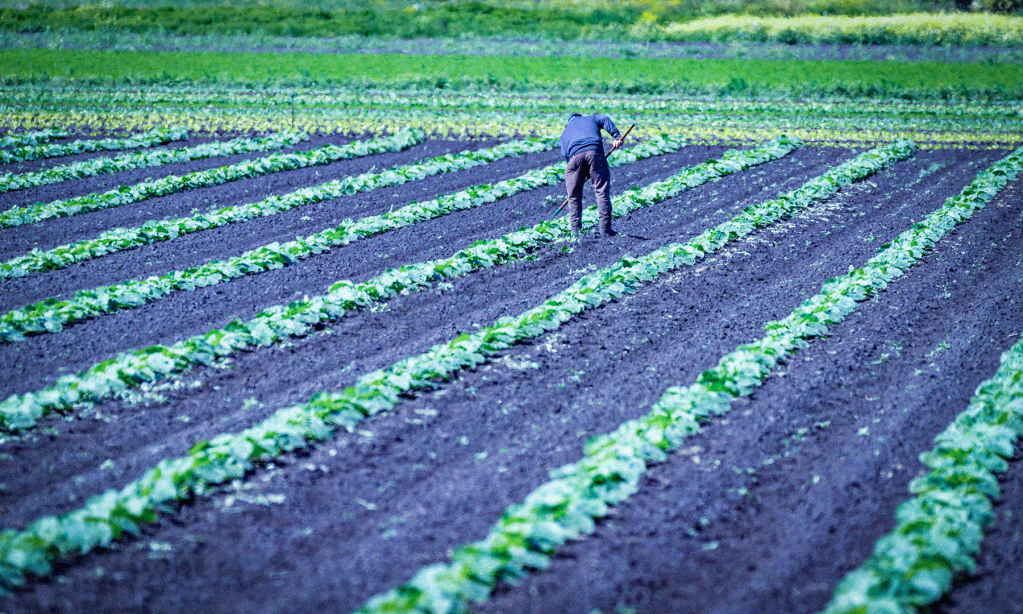Genetically modified (GM) crops are a contentious and polarizing topic, but with the threat climate change poses on agriculture—and consequently for food security—a growing number of voices are calling for the use of GM crops as a potential adaptation strategy.
Seeds can be genetically modified in a number of ways. For instance, some GM crops are modified to withstand a specific herbicide or insect, potentially reducing the amount of herbicide needed. In the context of climate change, seeds could theoretically be modified to be more resilient to droughts or floods, contain more nutrients, or increase crop yields—all of which would strengthen crop resilience in the face of increased weather volatility.
On the face of it, GM crops could be our answer to maintaining high yields in a changing climate—that is, if you’re willing to gloss over some potential risks.
Genetically modified crops exacerbate the risks of industrial agriculture
Many farmers, academics, researchers, and consumers are highly skeptical of GM crops—citing concerns such as reduced biodiversity, superbugs and superweeds, antibiotic resistance, new allergies, and the concern over potential unknown, long-term environmental and health risks. These are all valid issues in their own right that should give us pause. However, in many cases, the concerns about GM crops have as much or more to do with the prevailing industrial agriculture model as they do with the GM crops themselves.
For example, GM crops are often assumed to negatively impact biodiversity, but this isn’t inevitable. It depends on the conditions they are grown in. GM crops, just like non-GM crops, can negatively affect biodiversity if they are grown as mono-crops. In theory, GM crops could actually increase biodiversity if they reduced the need for pesticides and tillage. In practice, however, according to the Canadian Biotechnology Action Network, herbicide-resistant GM plants have not resulted in a reduction in herbicide use. Instead, herbicide use has increased over 20 years since GM crops started growing in Canada.
Those critics also voice concerns over increased risk of herbicide-resistant weeds and toxin-resistant insects, although resistance is a naturally-occurring process that happens with non-GM crops as well. The development of resistance tends to be worsened with aggressive use of herbicides, another mainstay of industrial agriculture.
If GM crops could be grown outside of the industrial agricultural model, these issues may not be as concerning. The problem is that genetically modified crops are inextricably connected to—and perpetuate—these unsustainable agricultural models.
GM seeds are a product subject to intellectual property rights and predominantly manufactured by a handful of consolidated agro-chemical corporations
The Monsanto Canada Inc. v. Schmeiser case in 2004 affirmed Monsanto’s (now Bayer’s) right to patent modified genes and cells within GM seeds, and extended intellectual property rights to the seeds themselves. This can prompt agrochemical corporations to pour money into developing new GM seeds to increase their profits. However, it has the added disadvantage of increasing corporate control over seed supplies—a control they do not hesitate to exercise—as shown by Monsanto’s history of suing farmers for infringing upon their GM patents.
This is especially concerning considering the trend of corporate consolidation among agrochemical companies, with the most recent consolidations taking place between 2017-18, as Dow and Dupont became DowDuPont (now DuPont de Nemours, Inc), ChemChina and Syngenta became ChemChina-Syngenta, Bayer absorbed Monsanto, and Badische Anilin und Soda Fabrik (BASF) acquired the investment Bayer had to sell in order to absorb Monsanto. By 2020, Bayer, Corteva, ChemChina-Syngenta and BASF collectively owned 51 per cent of the global seed market and are the primary providers of GM seeds worldwide.
High costs to develop these genetically modified crops and increased corporate consolidation go hand-in-hand in creating a virtual oligopoly on GM seeds
The Organisation for Economic Co-operation and Development (OECD) found that this most recent wave of consolidation was motivated, in part, by high costs associated with research and development, GM technology, and the procurement of patent rights. High costs may create barriers to entry, suppressing the creation and development of new competing firms.
Consolidation also effectively hinders competition and encourages collusion amongst strong players. This negatively affects innovation by encouraging firms to focus on developing seeds that will result in the greatest returns. In the process, this maintains mainstream industrial farming and its reliance upon synthetic inputs.
Embracing GM crops as a climate solution, as organizations like the World Economic Forum are advocating, would create further demand for GM seeds—granting these corporate conglomerates further influence and profits, and further harming organic and conventional seed companies.
Farmers would also become increasingly dependent on these dominant GM corporations, reducing their seed selection, increasing seed costs, and pushing them into unfavourable contracts to access GM seed patents. As farmers enter these agreements—essentially leasing the seeds as ‘technology’—they must rely on these companies to buy new seeds each year, because they cannot legally save seeds from their previous yield.
While growing GM crops is a choice, a push towards GM crops will mean an increase in farmer dependence and legal subjugation to these companies. When all your GM seeds are being provided by a handful of companies, what’s a farmer to do?
Corporate consolidation has contributed to an outsized political influence for the GM industry, which has won favorable regulation through extensive lobbying efforts. This happened in 2022, as a document leaked from Crop-Life Canada (an agrochemical industry conglomerate representing companies including BASF, Bayer and Syngenta) proposed guidelines for the Canada Food Inspection Agency that would grant seed companies rights not to inform consumers if their products are genetically modified.
Whether or not GM crops deliver on their promise of food security in a changing climate, embracing genetically modified crops as a climate change strategy would further entrench the industrial agricultural model and consolidate the seed market. The proliferation of industrial mono-crops could further reduce biodiversity, ultimately fulfilling the fears often associated with GM crops.
Corporations, particularly large-scale conglomerates, are first and foremost concerned with profit. It is short-sighted and potentially dangerous to fully embrace GM crops as a climate change adaptation solution without considering the political and economic realities in which this shift would take place.
If genetically modified crops are worth the risks, it may be best for the public sector to take the mantle, even if development of these seeds may be slower than it would be in private industry. It would, at least, allow us to overcome some of the challenges of a profit driven private sector by retaining some dimension of democratic influence.







